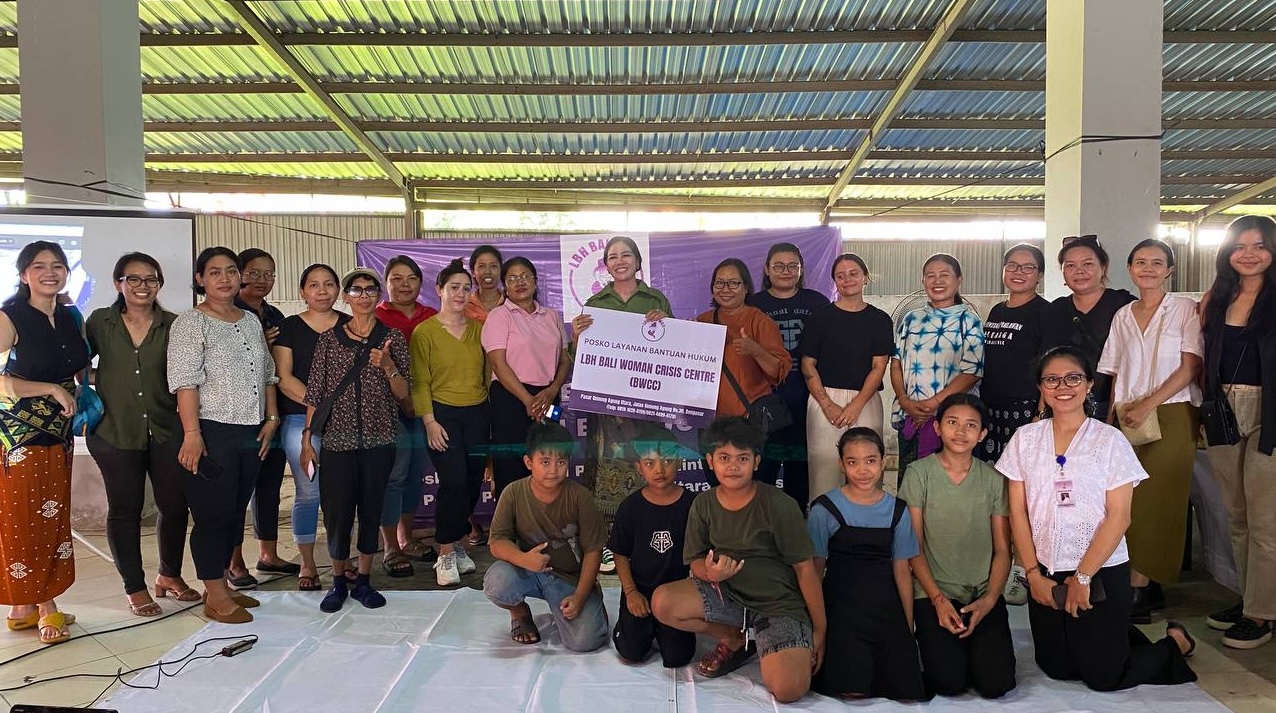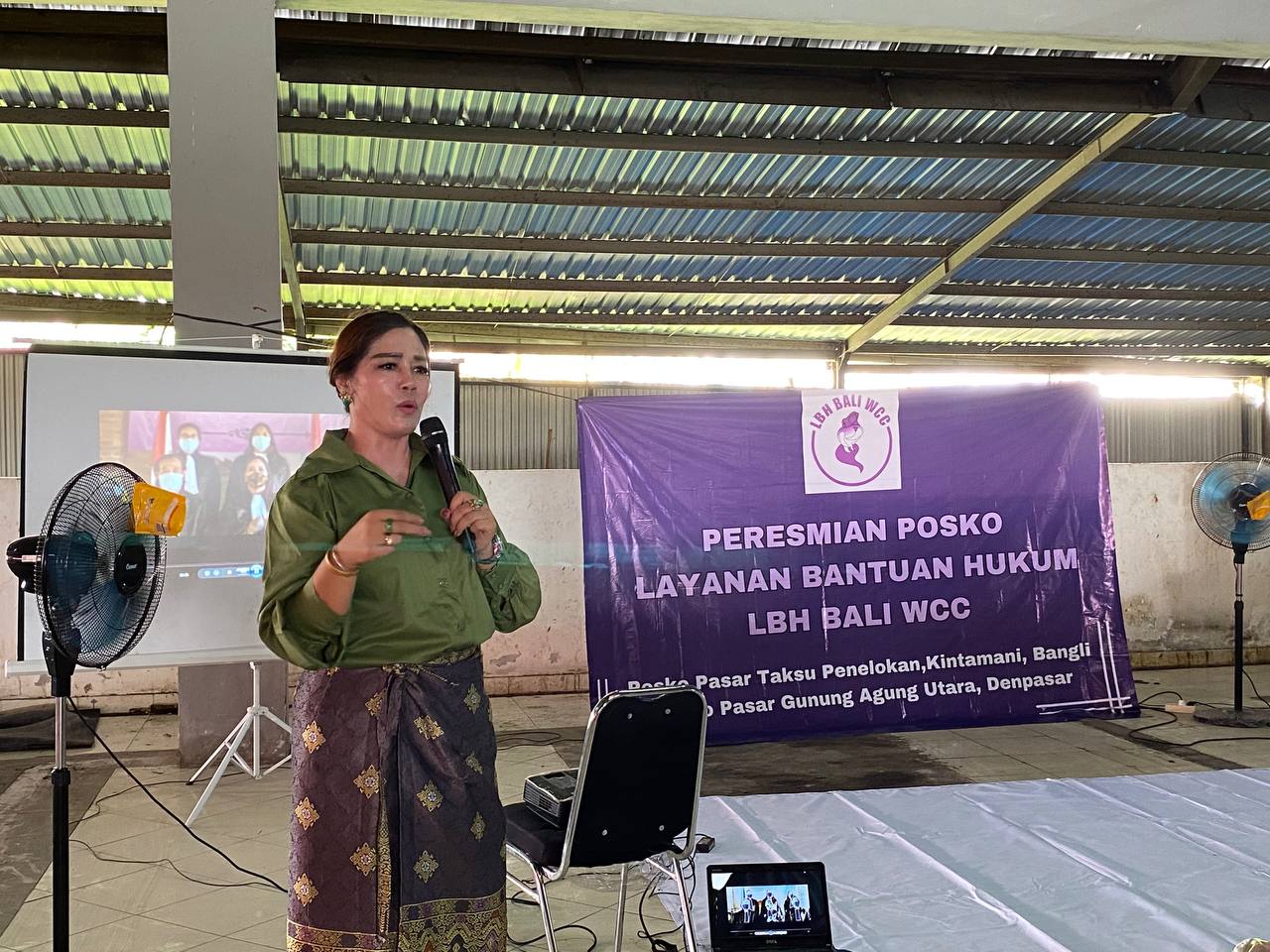BWCC Paralegal Station at Traditional Market

A group photo taken during the launch of the LBH BWCC paralegal station. Photo by Yuko Utami
“The characteristic of Balinese people is that very few are willing to report to offices. On average, it's non-Balinese women who report, foreigners, there are hardly any Balinese,” expressed Ni Nengah Budawati, Director of Bali Women Crisis Centre Legal Aid Institute (LBH BWCC). Buda hopes that the presence of paralegal station will provide access to legal assistance for justice for both the community and victims of violence.
The scent of salted fish permeates the air, haggling over prices fills the background noise. Porters hurry to carry bundles of fresh vegetables from the box trucks to the nearest stalls. Meanwhile, on the second floor, stalls lined with white tiles cover the entire building. Stall number two from the back has just been leased for 6 months by the Bali Women Crisis Centre Legal Aid Institute (LBH BWCC).
Pasar Gunung Agung (Gunung Agung traditional market) was chosen as the location for LBH BWCC to initiate a paralegal post in Denpasar City. Buda considers the market a suitable location because it directly faces the community, especially mothers.
The launch of this paralegal station, held on Friday (12/04), received enthusiasm from some visitors and traders in the market. Around 20 people attended the launch event of this paralegal station. One of the traders asked whether the case handling process involved funds or not. Ni Ketut Madani Tirtasari, Secretary of LBH BWCC, answered that legal aid is ensured to be free for clients who cannot afford it.
This paralegal station is one of the programs to expand access to justice and legal assistance for the community and victims of violence. LBH BWCC implements this program with full funding support from The Fund for Global Human Rights from the United Kingdom under the Legal Empowerment Fund (LEF) program.
The program is officially implemented from January 2023 to December 2024, aimed at improving access to legal services for the community and victims of violence in Bali by increasing the number of paralegals and establishing grassroots-level paralegal stations
In 2023, as the first year of the program's implementation, LBH BWCC recruited and trained 60 paralegals from the community. In 2024, as the second year of the program's implementation, LBH BWCC established two paralegal stations in two areas, namely Denpasar City and Bangli District.
Reporting on Cases of Domestic Violence and Gender-Based Violence Increases Since Covid-19

Budawati explaining about the paralegal station. Photo by Yuko Utami

Participants listening attentively during the socialization. Photo by Yuko Utami
Buda revealed that LBH BWCC receives many reports about cases of domestic violence and gender-based violence, with victims of varying ages and professions. “For gender-based online violence, it's not just young people, we also have cases of people aged 52 and above,” said Buda.
Victims and legal advocates go through a long process. Nevertheless, Buda is optimistic that all gender-based online violence cases will be handled. “Every gender-based online violence case we handle and accompany through LBH WCC, they no longer threaten, that's why I hope victims report quickly,” she said.
So far, victims have reported by phone. Few go directly to the LBH BWCC office. The presence of the paralegal station at Gunung Agung traditional market is expected to become an oasis amidst various threats faced by vulnerable groups.
Every Monday to Friday, the paralegal station is open from 8 am to 10 am. Ni Wayan Suciati, a paralegal and treasurer of LBH BWCC, will oversee the station. She will distribute brochures and conduct legal aid acceptance socialization and reporting procedures if there are cases. Even when staff are not present, the station will remain open for breastfeeding mothers.
Through the activities of the paralegal stations in these two regions, paralegals under the coordination of LBH BWCC who have received training can directly assist in providing support activities for victims of violence and the general public (litigation and non-litigation).